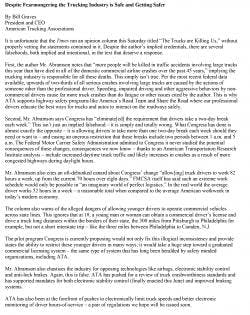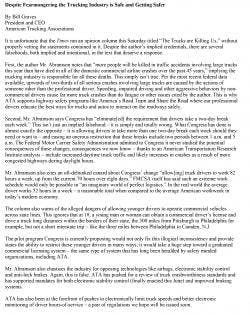“The trucks are killing us.” Not so, says ATA’s Bill Graves
Responding to what it said is the “latest in a series of baseless and defamatory editorials, letters and columns published by” The New York Times on Saturday, Aug. 22, American Trucking Assns. (ATA) President & CEO Bill Graves lashed out at “several falsehoods, both implied and intentional” in an op-ed submitted to the Times.
According to ATA, the Howard Abramson-penned op-ed, entitled, “The Trucks Are Killing Us,” misrepresented the safety focus of the trucking industry. Graves’ op-ed submission was rejected by the Times, ATA said.
Abramson is a former publisher and editorial director of Transport Topics Publishing Group, which is a unit of ATA, working with the group from 1998 through January 2014. He is also a contributor to Fleet Owner’s IdeaXchange online platform.
“It is unfortunate that the Times ran an opinion column this Saturday titled ‘The Trucks are Killing Us,’ without properly vetting the statements contained in it,” wrote Graves in the rejected op-ed. “Despite the author’s implied credentials, there are several falsehoods, both implied and intentional, in the text that deserve a response.”
In his op-ed, Abramson wrote that Congress has “pursued a number of steps to roll back safety improvements ordered by federal regulators,” including suspension of the restart mandate that required drivers to take consecutive 1 a.m. to 5 a.m. rest periods as part of a 34-hour restart. The 34-hour restart was not suspended. Abramson also criticized efforts to allow longer trucks, allow a pilot program to test an 18-year-old interstate driving age, and said Congress is discouraging FMCSA from “investing in wireless technology designed to improve the monitoring of drivers and their vehicles.”
Click here to read the New York Times op-ed
In Graves’ unpublished response, entitled “Despite Fearmongering the Trucking Industry is Safe and Getting Safer,” he writes that “Mr. Abramson says Congress has ‘eliminate[ed] the requirement that drivers take a two-day break each week.’ This isn’t just an implied falsehood – it is simply and totally wrong. What Congress has done is almost exactly the opposite – it is allowing drivers to take more than one two-day break each week should they need or want to – and easing an onerous restriction that these breaks include two periods between 1 a.m. and 5 a.m. The Federal Motor Carrier Safety Administration admitted to Congress it never studied the potential consequences of these changes, consequences we now know – thanks to an American Transportation Research Institute analysis – include increased daytime truck traffic and likely increases in crashes as a result of more congested highways during daylight hours.”
Graves also noted that Abramson’s claim that Congress wants truck drivers to work 82 hours a week, an increase over the current 70 over eight days, is also wrong. “FMCSA itself has said such an extreme work schedule would only be possible in ‘an imaginary world of perfect logistics.’ In the real world the average driver works 52 hours in a week – a reasonable total when compared to the average American workweek in today’s modern economy,” Graves wrote.
Many, ATA included, have noted that 18-year-olds are currently allowed to hold CDL and drive intrastate commerce, but not cross state lines. Under the current rules, an 18-year-old could travel hundreds of miles within a state’s border, but not “the three miles between Philadelphia to Camden, N.J,” Graves wrote.
Graves added that “the pilot program Congress is currently proposing would not only fix this illogical inconsistency and provide states the ability to restrict these younger drivers in many ways; it would take a huge step toward a graduated commercial licensing system – the same type of system that has long been heralded by safety minded organizations, including ATA.”
In his op-ed, Abramson wrote that the trucking industry is opposed to safety.
“All of these concessions to the trucking industry have gained traction in Congress even though the industry has consistently resisted safety improvements,” Abramson wrote. “The death toll in truck-involved crashes rose 17 percent from 2009 to 2013. Fatalities in truck-involved crashes have risen four years in a row, reaching 3,964 in 2013, the latest data available. Those crashes are killing not only car drivers but also, during 2013 alone, 586 people who were truck drivers or passengers.”
According to Graves, the claim of little to no concern for safety is false. “ATA has pushed for a review of truck crashworthiness standards and has supported mandates for both electronic stability control (finally enacted this June) and improved braking systems. ATA has also been at the forefront of pushes to electronically limit truck speeds and better electronic monitoring of driver hours-of-service – a pair of regulations we hope will be issued soon,” he wrote.
In addition, Abramson said that “more people will be killed in traffic accidents involving large trucks this year than have died in all of the domestic commercial airline crashes over the past 45 years, if past trends hold true. And still Congress continues to do the trucking industry’s bidding by frustrating the very regulators the government has empowered to oversee motor carriers.”
Graves said the implication is that the trucking industry is responsible for all highway deaths involving trucks. This is not true, he wrote. “Per the most recent federal data available, upwards of two-thirds of all serious crashes involving large trucks are caused by the actions of someone other than the professional driver. Speeding, impaired driving and other aggressive behaviors by non-commercial drivers cause far more truck crashes than do fatigue or other issues cited by the author. This is why ATA supports highway safety programs like America’s Road Team and Share the Road where our professional drivers educate the best ways for trucks and autos to interact on the roadways safely,” Graves said.
“ATA has also been at the forefront of pushes to electronically limit truck speeds and better electronic monitoring of driver hours-of-service – a pair of regulations we hope will be issued soon,” Graves added.
Graves concluded his op-ed submission summarizing what he said is the safety-conscious approach of the trucking industry.
“Improving safety is also at the core of ATA’s support for modest increases in trailer length for some trucks. With a simple increase in trailer size from 28 feet to 33 feet, studies have shown we can eliminate the 6.6 million trips to deliver the 69% of the American economy that trucks move, and that would reduce the number of truck miles traveled by 1.3 billion. Those trips not taken and miles not driven will result, based on crash rates, more than 900 crashes not had,” he wrote. “At the end of the day, there is no silver bullet, no magic gadget that will make roads entirely safe. But through education, by reducing crash risk through sound rules, safety technologies and tighter enforcement, we can continue the long-term improvements in truck and highway safety. Over the past decade, through the industry’s diligence and professionalism, as well as improvements in vehicle technology and enforcement, the number of truck-involved fatal crashes has fallen by a third.
“This is good news that some choose to ignore, but it is also a call for all of us – the industry, government regulators and motorists to look at the true roots of crashes and not use the politics of fear to impose counterproductive ‘solutions,’” he added.

